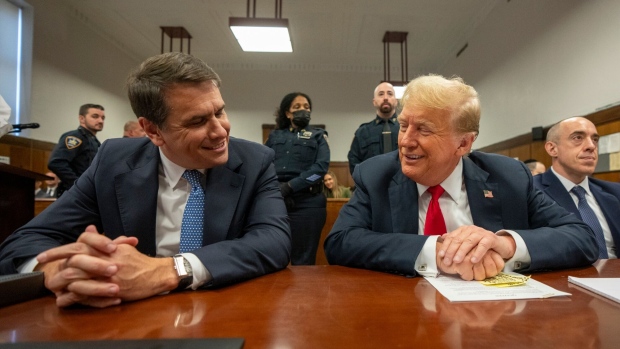May 28, 2024
Trump Was Victim of Extortion, Lawyer Tells Hush-Money Jurors
, Bloomberg News

(Bloomberg) -- Donald Trump’s lawyer in his hush money criminal trial told jurors that the business records at the center of the case were tied to legitimate payments to his his former attorney and fixer Michael Cohen, whose testimony he said they should reject.
In his closing argument on Tuesday, attorney Todd Blanche said the evidence failed to prove criminal intent by Trump, who’s accused of falsifying records to hide a hush money payment Cohen made to an adult-film star on his behalf before the 2016 election. The documents include Cohen’s invoices, checks Trump signed in the White House and internal Trump Organization records on the transactions.
Prosecutors used Cohen’s testimony to provide the connective tissue between the records and Trump’s criminal intent. But Blanche insisted that Cohen was a serial liar who went from loving Trump to hating him, and then made millions of dollars on books and podcasts castigating his former boss.
“Michael Cohen is the human embodiment of reasonable doubt,” Blanche told jurors in a packed Manhattan courthouse. “Michael Cohen is the GLOAT - literally, the greatest liar of all time.”
The first criminal trial of a former US president is coming to an end after nearly five weeks of testimony and evidence in a case brought by Manhattan District Attorney Alvin Bragg. Trump’s accused of falsifying records to conceal a payment to adult film star Stormy Daniels to keep her quiet about an alleged sexual encounter, part of a broader alleged scheme to influence the election with help from the publisher of the National Enquirer tabloid.
Prosecutors’ Final Pitch
Joshua Steinglass, a prosecutor for Bragg, also delivered closing arguments that spanned more than four hours and kept the jury in court later than initially planned. His wide-ranging speech at one point focused on the infamous Access Hollywood tape, which was largely avoided by Blanche, saying it gave Trump’s campaign a motive to cover up embarrassing stories.
“Four weeks before the election, the campaign was rocked to its core by the release of the Access Hollywood tape,” he said. “The candidate was literally bragging about grabbing women by the genitals.”
Steinglass’ closing argument was twice as long as the defense, which focused largely on Cohen’s credibility. Blanche said Cohen acted alone when he made the payment to Daniels, seeking to debunk his testimony that Trump authorized the deal at every step. Blanche told the jury that wasn’t true, and suggested Cohen went rogue.
Cohen, who was Bragg’s star witness after going to prison for various crimes, spent days testifying about Trump’s knowledge of the hush-money scheme. But Blanche said the jury shouldn’t believe Cohen, because he’s admitted to lying under oath.
“If there’s anything we’ve learned from this trial — Michael Cohen does not take that oath seriously,” Blanche said. “He’s lied repeatedly,” the defense lawyer said, citing a litany of lies Cohen told to Congress, prosecutors, and jurors at the Trump trial. “He’s like the MVP of liars.”
Blanche also argued that Trump is a victim of extortion, saying the case is rooted in an effort by Daniels and others to squeeze him for money before the 2016 election.
Daniels got the $130,000 payment after her publicist and lawyer threatened to go public with her story on the eve of the election, even though she’d previously denied the affair, Blanche said.
“This started out as an extortion, there’s no doubt about that, and it ended very well for Ms. Daniels,” Blanche told the jury as Trump and several family members watched.
Blanche said that Daniels was assisted in her hush money talks by her agent Gina Rodriguez and her lawyer Keith Davidson, who arranged the deal.
“There are a group of people who wanted to take advantage and extort money from President Trump,” Blanche said.
But the line of defense could fall flat for the jury, which has been told over and over again that Trump’s handling of the payment was the crime — regardless of what did or didn’t happen with Daniels.
No ‘Criminal Intent’
Blanche used part of his closing argument to try to defuse Trump’s poor political standing in Manhattan, which is heavily Democratic.
“This isn’t a referendum on your views of President Trump, this is not a referendum on the ballot box, who you voted for in 2016 and 2020, or who you plan to vote for in 2024,” Blanche said. “If you focused on what evidence you heard in this courtroom, this is a very, very quick and easy verdict.”
--With assistance from Erik Larson.
(Updates with detail from the government’s closing argument.)
©2024 Bloomberg L.P.

